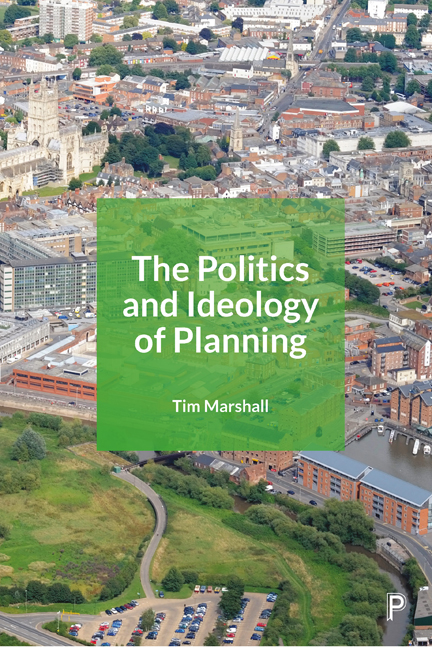Book contents
- Frontmatter
- Contents
- List of figures and tables
- List of abbreviations
- Acknowledgements
- 1 Introducing planning, politics and ideology
- 2 Writing on politics and ideology in planning
- 3 Ideologies in Britain, with initial linking to planning
- 4 Planning history, planning reform and politics and ideology
- 5 Planning expertise and planning law: autonomy from politics and ideology?
- 6 Ideology and politics in government, central and local
- 7 Ideology and politics in professions, lobbying, consultancies and pressure groups
- 8 Communication, the media and deliberation
- 9 Facets of planning action: heritage, local environment and design
- 10 Fields of planning action: housing, economy and infrastructure
- 11 Paths to improving the ideological and political dimensions of planning
- References
- Index
11 - Paths to improving the ideological and political dimensions of planning
Published online by Cambridge University Press: 05 January 2022
- Frontmatter
- Contents
- List of figures and tables
- List of abbreviations
- Acknowledgements
- 1 Introducing planning, politics and ideology
- 2 Writing on politics and ideology in planning
- 3 Ideologies in Britain, with initial linking to planning
- 4 Planning history, planning reform and politics and ideology
- 5 Planning expertise and planning law: autonomy from politics and ideology?
- 6 Ideology and politics in government, central and local
- 7 Ideology and politics in professions, lobbying, consultancies and pressure groups
- 8 Communication, the media and deliberation
- 9 Facets of planning action: heritage, local environment and design
- 10 Fields of planning action: housing, economy and infrastructure
- 11 Paths to improving the ideological and political dimensions of planning
- References
- Index
Summary
Planning in the UK has a near-continuous debate on ways to redirect the activity so as to obtain better results, largely among the ‘planning community’, both practitioners and academics, but sporadically spilling over into some bigger public arenas, perhaps spurred by a report from a think-tank or an especially sharp current issue or problem (inner-city decline, climate change's effects, death of the high street, for example). Even more occasionally a major review may be undertaken of planning as a whole, not just of one or more of its component parts. Such reviews have in fact been exceptionally rare. The most recent, the TCPA-sponsored Raynsford Review, reported in November 2018 and is the most authoritative and fully considered assessment for decades, with only the Royal Commission on Environmental Pollution report of 2002 and the Nuffield Report of 1986 having to some degree similar broad perspectives. It is noteworthy that no government reviews of planning of a comparable breadth have been undertaken since the Planning Advisory Group reported in 1965. Government planning reform programmes since the 1970s have normally proceeded on the basis of sketchy evidence and political hunches. What follows in this chapter will lean partly on the Raynsford Review (2018a, 2018b), although that Review did not of course have the specific focus of this book, and so the suggestions here go beyond the Review.
This chapter will first provide a listing of the problems identified in Chapters 2–10, partly to give a convenient summary of matters treated in the book, and partly to be able to have at hand the connection of the suggested measures to some of those problems. There are then sections on what to do about ideology and planning, and what to do about politics and planning, attempting to keep these analytically distinct. These follow the Chapter 1 framework, looking at possible ideological amalgams for planning, and the institutional and pressure politics needed to support good planning. Then a sketch for a possible reformed planning system (levels and roles) is given, and final comments on combining ideology and political reforms as a whole.
- Type
- Chapter
- Information
- The Politics and Ideology of Planning , pp. 225 - 248Publisher: Bristol University PressPrint publication year: 2020



